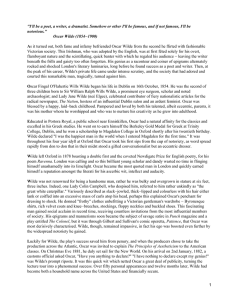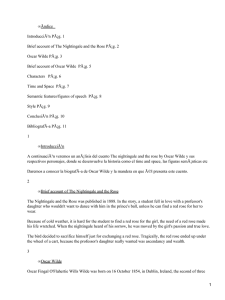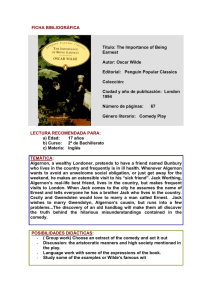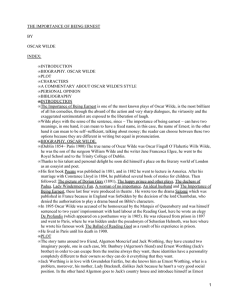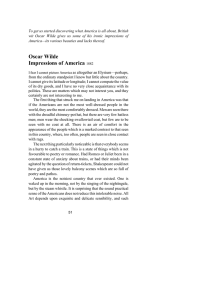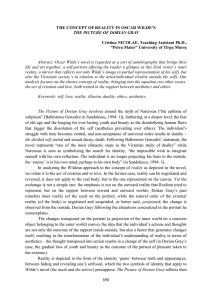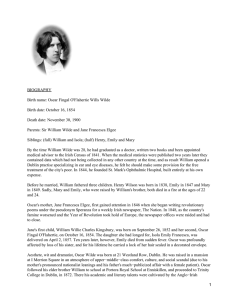George MacDonald and Oscar Wilde
Anuncio
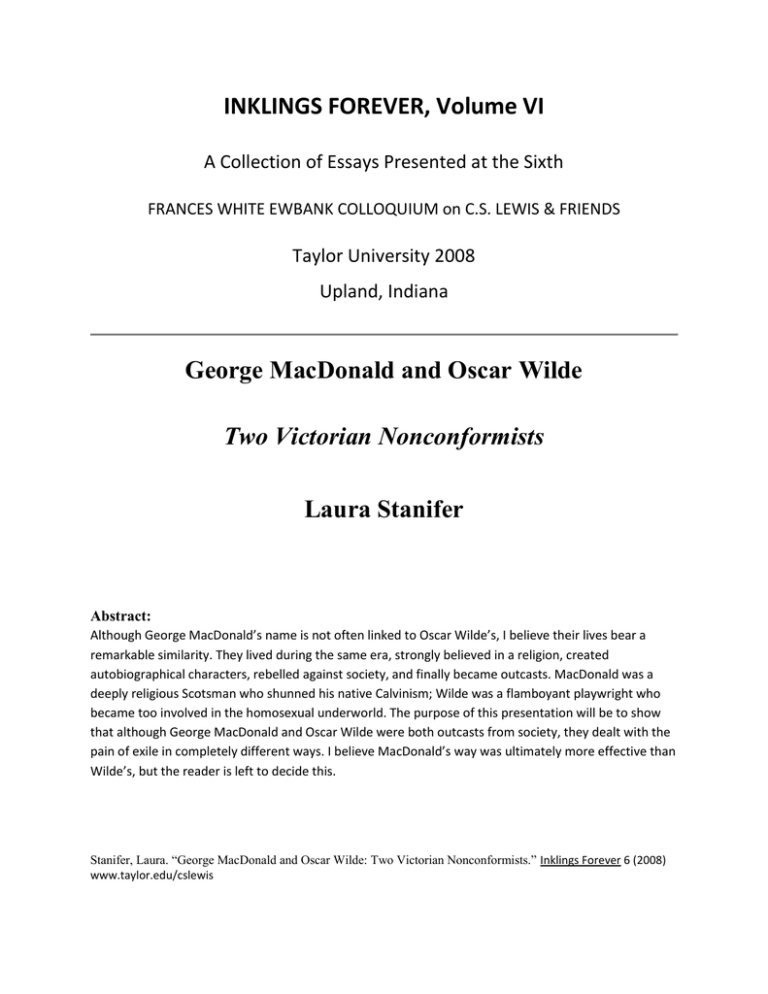
INKLINGS FOREVER, Volume VI A Collection of Essays Presented at the Sixth FRANCES WHITE EWBANK COLLOQUIUM on C.S. LEWIS & FRIENDS Taylor University 2008 Upland, Indiana George MacDonald and Oscar Wilde Two Victorian Nonconformists Laura Stanifer Abstract: Although George MacDonald’s name is not often linked to Oscar Wilde’s, I believe their lives bear a remarkable similarity. They lived during the same era, strongly believed in a religion, created autobiographical characters, rebelled against society, and finally became outcasts. MacDonald was a deeply religious Scotsman who shunned his native Calvinism; Wilde was a flamboyant playwright who became too involved in the homosexual underworld. The purpose of this presentation will be to show that although George MacDonald and Oscar Wilde were both outcasts from society, they dealt with the pain of exile in completely different ways. I believe MacDonald’s way was ultimately more effective than Wilde’s, but the reader is left to decide this. Stanifer, Laura. “George MacDonald and Oscar Wilde: Two Victorian Nonconformists.” Inklings Forever 6 (2008) www.taylor.edu/cslewis George MacDonald and Oscar Wilde: Two Victorian Nonconformists Although George MacDonald‟s name is not often linked to Oscar Wilde‟s, their lives bear a remarkable similarity. They lived during the same era, strongly believed in a religion, created autobiographical characters, rebelled against society, and finally became outcasts. MacDonald was a deeply religious Scotsman who shunned his native Calvinism; Wilde was a flamboyant playwright who became too involved in the homosexual underworld. The purpose of this presentation will be to show that although George MacDonald and Oscar Wilde were both outcasts from society, they dealt with the pain of exile in completely different ways. I believe MacDonald‟s way was ultimately more effective than Wilde‟s. George MacDonald was born in 1824, thirty years before Oscar Wilde, but he lived six years longer. No one interested in his writings can ignore the important part his upbringing played in the beliefs he would later form. Calvinism, the strict doctrine that John Knox brought to Scotland, was a constant presence in MacDonald‟s childhood, creating a kind of resentment in his heart and a yearning after a loving God that would follow him for the rest of his life. His grandmother was one of the most dogmatic Calvinists one could ever wish to meet, but his father was less rigid in his beliefs. Richard Reis asserts, “His father was a nonsectarian Christian of the sort which values the Bible more than what anybody says about it” (20). Between MacDonald and his father, there was always a strong bond which influenced him in how he began to think of the Heavenly Father. Later in life, MacDonald was pretty candid about his dissatisfaction with Calvinism: I well remember feeling as a child that I did not want God to love me if he did not love everybody. I had been taught that God chooses some but not others. My very being recoiled from the hint of such a false idea. Even were I one of the few, the chosen, the elect, I could not accept love from such a God. The kind of love I needed was essential to my nature—the same love that all men needed, the love that belonged to them as the children of the Father, a love he could not give me unless he gave it to all men. (Phillips, 125) Oscar Wilde‟s background also gives us some important insight into the events that occurred later in his life. His father, Dr. William Wilde, fathered three illegitimate children and was accused of having an affair with one of his female patients. The scandal of this affair resulted in a trial. William was forty-one years old, the same age his son would be when he was put on trial. The character of Wilde‟s relationship with his mother and father was not noteworthy for its spirituality, but rather for a common brilliancy and love of notoriety. His mother, Lady Wilde, had been an accomplished poet in his native Ireland, and her revolutionary pieces for a newspaper called The Nation contributed to the jailing of its founder. It seems the Wildes had no trouble drawing attention to themselves. Another key difference between both authors‟ backgrounds is that George MacDonald grew up in rural Scotland, whereas Wilde grew up in fashionable Dublin. MacDonald‟s simple though strict lifestyle as a farmer‟s son, eating oatcakes and learning the dialect, was altogether different than the atmosphere Wilde was thrown into as a child. According to Merlin Holland, Wilde‟s grandson, “through the Wildes‟ house came a procession of lawyers, artists, literary men and academics from Trinity” (19). Wilde and his two siblings, brought up in an upper-middle class home, were encouraged to sit at the dinner table and listen. It is easy to see how this early experience at being in the spotlight could contribute to Wilde‟s public exhibitions of brilliance and his penchant for living a double life. Both authors followed a kind of religious system. George MacDonald seemed to have been born with a thirst for spiritual truth. He maintained that only if a man walks with God and obeys him can he live to the fullest. One of his deepest beliefs is found in the following quote: “Where there is no ground to believe that God does a thing, except that men who would explain God have believed and taught it, he is not a true man who accepts men against his own conscience of God. I will accept no explanation of any way of God that involves what I should scorn as false and unfair in a man” (Phillips, 249). MacDonald, always humble, was still very strong in what he felt to be true and what he felt to be false. As a young man, he sensed the need to preach the gospel; and although his first church did not work out well, he continued his search for Christ throughout the rest of his life. His deep commitment was observed by many, including C.S. Lewis, who said, “I know hardly any other writer who seems to be closer, or more continually close, to the spirit of Christ Himself” (Lewis, 416). Oscar Wilde‟s religion was not one in the traditional sense of the word, but his belief in aestheticism could easily be compared to the following of a doctrine. Both MacDonald and Wilde were drawn toward John Ruskin, whose theories on the moral significance of art appealed to the “intellectual, the noble” and “the high minded” in Wilde, according to Merlin Holland (43). Wilde himself said, “Aestheticism is a search after the signs of the beautiful…It is, to speak more exactly, the search after the secret of life” (Keyes, 52). He obviously carried this belief into his homosexual lifestyle, often calling his lovers “beautiful boys.” As for other religious influences, Wilde was always fascinated by the Roman Catholic church, which he was converted to on his deathbed. Of course, this fascination could easily be linked to his aestheticism, because of the beauty of Catholic rituals. It is also notable that both Wilde and MacDonald borrowed from other books to enhance their own works. According to Ralph Keyes, “A woman once told Wilde that a key episode in one of his plays reminded her of a scene in one written by Augustin-Eugene Scribe.” Wilde replied, “Taken bodily from it, dear lady. Why not? Nobody reads nowadays” (30). In MacDonald‟s case, his novel Salted with Fire seems to have combined elements from Tess of the d’Urbervilles, which was published in 1891, and Silas Marner, published in 1861. In Salted with Fire, a hypocritical minister who has acted improperly to a young woman sees her in his congregation years later. A scene almost exactly the same appears in Tess of the d’Urbervilles, when Alec d‟Urberville sees Tess, the woman he raped, in his crowd of listeners. The similarities to Silas Marner are equally striking. The particular circumstance of a young man hiding a sin, and an abandoned baby being raised partly by an old man who is considered addled in the head happens in both novels. Also, the unusual name “Eppie,” which is the child found in Silas Marner, appears in Salted with Fire as the name of an old woman. These coincidences may seem minor, but they are not unreasonable since MacDonald could have easily read and admired both works of his contemporaries Thomas Hardy and George Eliot. The beginning of MacDonald‟s rebel against society occurred in 1851, when he took his first and last pastorate at Arundel, in West Sussex, England. The honeymoon between himself and his parishioners was cut short when he published his translations, “Twelve of the Spiritual Songs of Novalis,” which brought on the fear that he was polluted with German ideas. MacDonald‟s original thoughts were extremely unwelcome to the congregation, among them his disbelief in infant damnation—that is, that unbaptized infants would go to hell. Also alarming was his conviction that “the opportunity for the heathen to be saved did not end at their death” (Hein, 12). The church responded to these heresies by severely cutting MacDonald‟s salary in the hope that he would resign; and resign he did, in 1853. His ideas would continue to be publicly rejected through the next several years, when he published his first novel, David Elginbrod. One critic objected to the simplistic “religion showing itself in the childish and the small…such as finds God in the sough of fir trees,” and called the theology evident in the novel “lax heresies” (Wolff, 256). To a country bound in tradition, his thoughts were shocking and even liberal. He would not back down from his true self, though. Even in small matters such as dress, he was unusual and remarkably like the flamboyant Oscar Wilde. Robert Wolff describes him as “tall, broad-shouldered, and athletic in build,” having “a strong taste for finery, appearing on the streets of London…in full Highland costume” (6). A Chicago newspaper noticed “his diamond pins, jeweled shirt-studs, massive watch-chain, daintily-shod feet, and Christ-like countenance” (6). This was indeed a curious man. MacDonald‟s life seemed to be one hardship after the next. Never completely healthy, he struggled with tuberculosis continually and watched it take the lives of four of his eleven children. He was never really free from money problems and had to depend upon several patrons to feed his family, such as Lady Byron. Through all this, though, his faith in God was not shaken, and his list of literary admirers grew. Charles L. Dodgson, known as Lewis Carroll, was perhaps the most intimate with the MacDonald family, and decided to publish Alice in Wonderland because of the enthusiastic response it received from the MacDonald children. It is interesting to note what a unique perspective MacDonald really had. It was impossible to put his beliefs in a box. He started out a Calvinist, became a minister at a Congregational church, and later converted to the Church of England. Finally, while he was living at the family home in Italy, his wife played the organ at a Catholic church (The Victorian Web). Rolland Hein asserts that “unlike most Evangelicals, he could find an enriching fellowship with men of differing doctrinal persuasions” (17). Although MacDonald adhered to no one‟s opinion but God, some of his ideas appeared to be influenced by others, such as Frederic Denison Maurice, a leader of the Christian Socialist movement (Hein, 18). In addition, MacDonald was unperturbed by the theory of evolution. When we take all these facts into account, it is easy to see why he was considered liberal. Oscar Wilde‟s nonconformist lifestyle first began to appear in his college days at Oxford. His famous quote, “I find it harder and harder every day to live up to my blue china” was condemned by a minister at Oxford as “a form of heathenism” (Holland, 40). Wilde‟s strange ideas of beauty also came out early in his preference for young men. Despite his marriage to a beautiful girl named Constance Lloyd, his male lovers were many. His goal was to be either famous or notorious, and he became both. The unnerving way in which he appeared publicly, with long hair, fur coats, and purple flowers in his buttonhole, was ridiculed in British and American newspapers such as Punch. Although his plays such as The Importance of Being Earnest were widely celebrated, the public was beginning to become suspicious. Wilde pretty much signed his death sentence when he published The Picture of Dorian Gray in 1890. If he had planned on concealing the sins of Dorian Gray, it was a futile hope. The newspapers certainly weren‟t fooled, declaring that his audience was a group of “perverted telegraph boys” (Holland, 135). Besides the unusual communication between the men in the novel, which could easily be interpreted as homoerotic, there was the real-life evidence of Wilde‟s lover at the time, John Gray. Anyone with half a brain could see that Wilde had based his novel on this young man: He had an absurdly youthful appearance, and his last name was Gray. That was all the public needed to know. Wilde was treading on shaky ground. It was Wilde‟s last chance to reform, but he refused. He met Lord Alfred Douglas, whom he called “Bosie” in the summer of 1891. Bosie, sixteen years Wilde‟s junior, was considered to be a very good-looking young man with blond hair and strange blue eyes. It did not take long for them to become intimate, and they soon began appearing everywhere together. According to Merlin Holland, Bosie introduced Wilde to the male prostitute, a most dangerous and fascinating experience. Wilde said later, “It was like feasting with panthers. The danger was half the excitement” (144). This lifestyle of pleasure resulted in bankruptcy after Wilde and Bosie had spent more than five thousand pounds in three years together. This was not the worst, though. Bosie‟s father, the Marquis of Queensberry, was outraged about his son‟s public exhibitions with Wilde, and he threatened several times to remove his allowance. This only served to make Wilde and Bosie appear in public even more, which was very imprudent on their part. In 1895, Queensberry left a note for Wilde accusing him of sodomy, and Wilde, apparently losing his head, sued the man. The trial, which was one of the most famous ones in history, was not kind to Wilde. At the beginning, his answers were flippant and witty, but after several days of questioning, he had been crushed. Sentenced to two years‟ hard labor, his exile from society was complete. It is now necessary to observe how each of these gifted men dealt with their exile. One could say that MacDonald was not as much an outcast to society as Wilde became; but in many respects, he was prevented from doing what he had set out to do. He could no longer pastor a conservative church, and some of his writings were very badly received. Because of the publication of David Elginbrod, he was unable to receive the Chair of Rhetoric and Belles Lettres at Edinburgh University that he had applied for in 1865. Unfortunately, a false reputation of heterodoxy continued to follow MacDonald like a grungy dog, and even today, very few people realize his true worth. MacDonald was a resilient fighter. Despite many setbacks, he continued to focus on obeying God. After his disastrous experience at the church in Arundel, he began lecturing on English literature and theology. He also obtained many preaching engagements, but his preaching did not stop there. He wrote over fifty books, twenty-five of them novels—thirteen Scottish and twelve English. For a man struggling with ill health and at least six family deaths, he was amazingly energetic. His thirst to learn was a lifelong pursuit, and after his exile, his theology was being constantly honed. The preaching that was infused in his novels and that his audience often found hard to imbibe is what is most precious to many people today. In an age where the truth is not shouted from the rooftops but painted up, feathered, and tarred, in an effort to conceal it or make it look better, MacDonald‟s writings are like water in the desert. His ideas are still fresh today: Remember that the service he [God] requires is not done in any church. He will say to no one, “You never went to church: depart from me, I do not know you.” But he will say, “Inasmuch as you never helped one of my Father‟s children, you have done nothing for me.” Church is not the place for divine service. It is a place of prayer, a place of praise…as is every place…But the world in which you move, the place of your living and loving and labor, not the church you go to on your day off, is the place of divine service, the place where God works righteousness into your being. (Phillips, 179) The way in which Oscar Wilde coped with the pain of exile was something altogether different. He confessed, “I must say…that I ruined myself: and that nobody, great or small, can be ruined except by his own hand” (Keyes, 18). It was one of his rare serious quotes; and few can help but pity him, in all his brilliance of mind, for what his life turned out to be. To the last, he was unapologetic for his homosexuality, saying, “To have altered my life would have been to have admitted that Uranian [or homosexual] love is ignoble. I hold it to be noble, more noble than other forms” (Keyes, 18). Prison hardly kept him from having homosexual pursuits. In the last two years of his life, he indulged in a kind of homosexual binge, resuming his relationship with Bosie and also with other men. He drank huge amounts of alcohol, threw parties, spent money, and couldn‟t stop talking. He lived like one who knew that his life was going to the dogs; and he didn‟t care. While MacDonald maintained “It is God to whom every hunger…is to be referred,” (Phillips, 206) Wilde said, “Even a color-sense is more important, in the development of the individual, than a sense of right and wrong” (Keyes, 52). Wilde‟s friend and lover, Robbie Ross, tried to awaken Wilde‟s conscience (and his own) by suggesting he stay away from male prostitutes and get married instead. Wilde told him he exemplified “the beauty and the uselessness of Conscience” and made a joke of the marriage suggestion, saying, “I am quite sure that you will want me to marry this time some sensible, practical, plain, middle-aged boy, and I don‟t like the idea at all” (McKenna, 458). Both men lived out their principles, or lack of, rather, and Wilde ended up a shattered man. It is extremely helpful to look at the novels of these men when examining their lives. Because Wilde published only one, we will look at The Picture of Dorian Gray. Dorian is a naïve young man whom some might call “beautiful.” His artist friend, Basil Hallward, is painting a portrait of him, and when Dorian sees it, he is both delighted and devastated, for he knows the picture will always stay the same while he will grow old and ugly. He makes a fatal wish that the situation would be reversed, that it is the painting that will grow old and that he will have everlasting youth. Not long after, he causes a girl to commit suicide, and finds out that his wish has come true. The blood that should be on his hand is now forever on his portrait. For twenty years, he lives a live of perversity and takes a strange delight in watching his painting grow more and more grotesque. Finally, he kills a man. Unable to bear the fear of discovery, he decides he is going to murder his conscience, which is in the form of this portrait. As soon as he stabs the canvass, though, a hideously ugly man drops to the floor and the portrait is restored to its original beauty. In trying to kill his conscience, Dorian has killed himself. The reading of this novel is significant in understanding Oscar Wilde himself. Why did he choose to kill Dorian Gray instead of reforming him? Had he lost all faith in the power of redemption himself? Why did he write this novel, baring his heart to the world and creating a mix of characters that were so much like himself? He was the one people spoke of as doing strange sins, like Dorian Gray. He was a worshipper of art, like the character Basil Hallward. And he was the man who would spout off witticisms until he was cold in his grave, like Lord Henry Wotton. The spiritual content in Dorian Gray is interesting as it provides us a look into Wilde‟s final beliefs. Dorian hears some scripture from a friend twice. The first time, he shows his good friend Basil Hallward his now hideous portrait. Basil, sick with shock, urges Dorian to repent. “It is never too late, Dorian,” he says. “Let us kneel down and try if we cannot remember a prayer. Isn‟t there a verse somewhere, „Though your sins be as scarlet, yet I will make them as white as snow‟? (193)” Dorian insists that it‟s too late for him and plunges a knife into the man‟s neck. Months later, Lord Henry, the man who originally corrupted Dorian, quotes a scripture mockingly: “What does it profit a man if he gain the whole world and lose…his own soul” (258). Dorian has a brief relapse of conscience near the end of the novel, a wish to reform, but it is a hypocrite‟s wish. He is still seeking a sensation without undergoing the pain to make it a true penitence. This illustrates Wilde‟s skepticism in the power of repentance and reform. He certainly knew the scriptures—he even converted to Catholicism on his deathbed—but he had no conviction in the power of redemption. This sad truth was played out in the way he died: desperate but unwilling to change, much like Dorian Gray. The novel we will look at for George MacDonald is Salted with Fire. It was his last novel and his last testament of faith, written when he was seventy-one. James Blatherwick is a young man studying to be a minister who commits an unforgivable sin. Weakened by his attraction to a pretty servant, he submits to his lust in one moment of fate and afterwards abandons the girl. She finds that she is expecting his child, and now penniless and heartbroken, she falls into a rough lifestyle and accidentally leaves the child on a Scottish moor. He is found and taken care of by another woman, and Isy, the young mother, recuperates from her illness by ironically staying with the fallen minister‟s parents. James Blatherwick, weakened by the struggle with his conscience, falls ill with a fever, and when it breaks, he has been sufficiently “salted with fire” to repent of his sins. He marries Isy and humbly begins ministering to his fellow man again. Because this was MacDonald‟s last novel, it shows us the state of his heart during his last few years. His convictions had not been changed; neither had his faith. He saw his life as having a fulfilling ending, so he gave this novel one. It was the key message of redemption: “Some people nothing but an earthquake will rouse from their dead sleep: I was one of such. God in His mercy brought on the earthquake: it woke me and saved me from death” (324). This was MacDonald‟s message. This was the one truth he wanted to communicate his whole life—that God is love and He will save you from death. Although MacDonald died from a stroke eight years later, in 1905, those who admire and love him know that he was saved from death. Today, the name of Oscar Wilde is much more well-known than that of George MacDonald. Wilde‟s plays are continually being updated for the screen; his works are still assigned reading in some classrooms. Although MacDonald‟s fantasy At the Back of the North Wind and others have received recognition, it is a rare person who even knows who George MacDonald is, let alone what he believed in. But then, MacDonald never sought worldly fame. Wilde did, and he received his reward in full. He declared, “Each of us has heaven and hell in him” (Keyes, 82). MacDonald had more of heaven in him that many of us can hope to have…because he desired it. Right now, the best thing we can do for MacDonald‟s legacy is to read—read his words, and read the words of the One he loved above all else, Jesus Christ. Works Cited Hein, Rolland. The Harmony Within: The Spiritual Vision of George MacDonald. Eureka: Sunrise Books, 1982. Holland, Merlin. The Wilde Album. New York: Henry Holt and Company, 1997. Keyes, Ralph. The Wit and Wisdom of Oscar Wilde. New York: Gramercy, 1996. MacDonald, George. George MacDonald: An Anthology. Ed. C.S. Lewis. 1946. MacDonald, George. Discovering the Character of God. Ed. Michael Phillips. Minneapolis: Bethany House, 1989. MacDonald George. Salted with Fire. Whitehorn: Johannesen, 1996. McKenna, Neil. The Secret Life of Oscar Wilde. New York: Basic Books, 2005. Reis, Richard H. George MacDonald. New York: Twayne Publishers, 1972. Wilde, Oscar. The Picture of Dorian Gray. New York: Viking, 2000. Wolff, Robert Lee. The Golden Key: A Study of the Fiction of George MacDonald. New Haven: Yale University Press, 1961. “George MacDonald: Biography.” The Victorian Web. <http:www.victorianweb.org/authors/gm/bio.html>.

